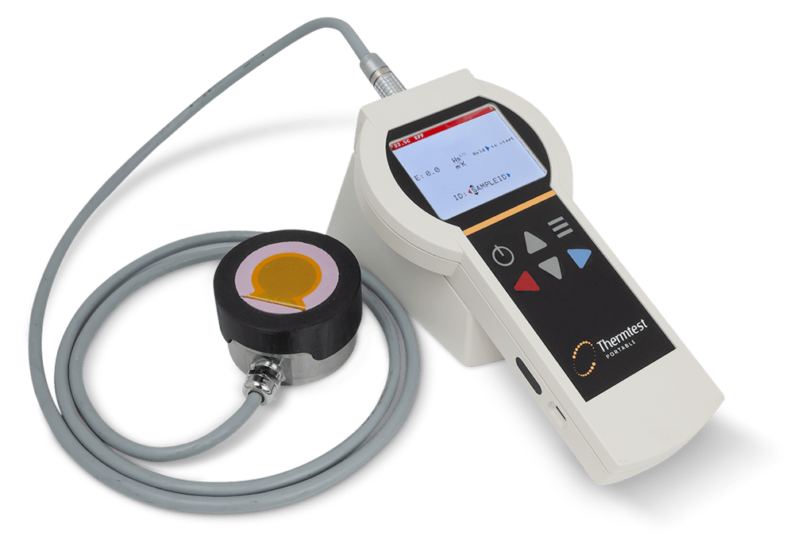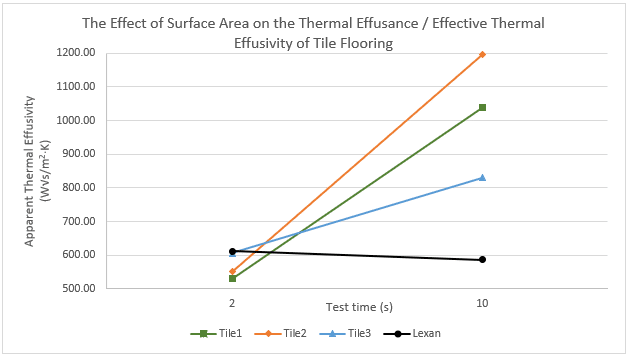The apparent thermal effusivity / thermal effusance (W√s/m2K) of floor tiles were measured using TPS-EFF (Transient Plane Source-Effusivity) to determine the effect of surface roughness on thermal effusance.

Transient Plane Source – Thermal Effusivity Meter
TPS-EFF is a portable thermal effusivity meter for textiles with a thermal effusivity measurement range of 35 to 1700 (W√s/m2K) and a temperature range of -10 ºC to 50 ºC. A single measurement can be set to 2 or 10 seconds in duration. The experiment was conducted in accordance with the ASTM D7984-16 standard of testing method as much as possible, keeping in mind that flooring samples are not textiles but are similar. Due to the robust nature of thermal effusivity as a value, it was deemed worthwhile to attempt to measure the thermal effusivity of flooring with this method.
In non-solid samples, there are more modes of heat transfer than solely conduction. When other heat transfer mechanisms such as convection and radiation are present in the sample, thermal conductance becomes a more appropriate term than thermal conductivity. Therefore, thermal effusance or effective thermal effusivity is more appropriate to use over thermal effusivity in the case of these measurements.
Thermal effusivity is most typically measured to predict how ‘cool’ or ‘warm’ a material feels. It has a square root proportionality to the density, thermal conductivity, and specific heat capacity of the material. Highly dense samples made of materials with high thermal conductivity and specific heat capacity values have high thermal effusivity values and vice versa. Depending on the situation, one might want a material to feel hot or cold to instill a feeling of comfort to the user. A user would want a winter coat to feel warm in cold weather or a car interior to feel cool in the summer.
In the case of flooring, tile floors are resistant to water and are often used for bathrooms and other rooms that encounter moisture on a frequently. These tiles are highly dense and, therefore, typically exhibit high values for thermal effusivity which corresponds to a cold feeling. A common expectation when exiting from a hot shower and stepping on a floor tile is that it will feel very cold and smooth. It should be possible to alleviate this sensation of cold by roughening the surface of the floor tile, altering the contact between tile and foot by introducing air pockets between these two surfaces via contact resistance. Since air has a very low value for thermal effusivity, a tile can be expected to feel warmer as the surface becomes rougher.
In this experiment, three flooring tiles of varying roughness (Image 1) were measured for thermal effusance using a TPS-EFF meter. Test times of 2 and 10 seconds were used to simulate both short and long touch times to determine how the tiles feel on the initial touch compared to when the heatwave has had a chance to penetrate past the rough surface and into the bulk of the sample. These tile samples will be compared to a sample of Lexan that is homogeneous and smooth, which experiences very little change in measured thermal effusance from a 2 to a 10 second touch time. The results can be found in Figure 2.

Figure 1. Three flooring samples for effusivity testing. Left: Tile 1. Center: Tile 2. Right: Tile 3.

Figure 2. A comparison of apparent thermal effusivity or thermal effusance values of three tile flooring samples of varying roughness. Samples were tested at 2 and 10s touch times to simulate the feeling of touching the flooring for both short and long periods of time, as the feeling will change as the heat penetrates through the surface layer of the flooring and further into the bulk of the flooring. Lexan was included as a smooth, homogeneous material control where little change between 2 and 10s is expected in the effusance values.
The results indicate that two-second test times resulted in lower thermal effusance readings when compared to the corresponding ten-second test times for each sample tile. This means it is true that surface roughness has a large influence on the effusance for short test times. Much of this effect can be attributed to the increased contact resistance between the sample and the sensor. Although the three tiles all exhibited large effusance values for the 10 second test time that varied greatly (~400 effusance units of difference), the enhanced effect of contact roughness detected by the 2 second touch time resulted in effusance values that were much more similar between tiles (~100 effusance units of difference). This implies that by varying the surface roughness of a flooring tile, it is possible at short touch times to make it feel very similar to another tile that has different bulk thermal properties.
TPS-EFF has a 5% accuracy and a 2% reproducibility, making it a highly accurate and precise instrument for measuring thermal effusivity of textiles and other materials.